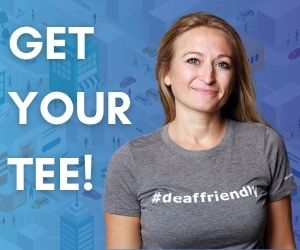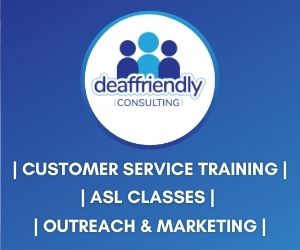Position Statements
LP Connect - An Example of Cultural Appropriation
December 29, 2015
Last month we shared about an issue that was deeply concerning to us: a general spoken language agency, LP Connect that is certifying businesses as “Deaf Friendly”. We stand by our belief that certain things, such as certifying businesses as Deaf friendly should be done by Deaf people, and not hearing owned businesses. We asked that they halt their Certified Deaf Friendly program and instead allow Deaf consumers to decide for themselves. LP Connect chose not to consider our request, a decision we are disappointed by.
We made the decision as an organization to go public with our concern in the form of an open letter and vlog, because we believe in community transparency, advocacy and ethics. In addition, we wanted to model for our community what holding businesses accountable looks like.
When businesses are harmful, exploitative, and oppressive we need to be vigilant about letting them know their actions are not okay. And we need to make sure our community knows about it. Sharing our experiences with each other is how we can make changes in the world.
Today, it is easier than ever to leverage social media and the Internet as agents of change. To share information. To leverage skewed power dynamics. To stand up for what we believe in and ask others to join us.
We’ve created a website platform, www.deaffriendly.com so Deaf consumers can share with each other and the world what #deaffriendly means and the impact it has on our lives when businesses are #deafchallenged.
As we end 2015 and move towards a new year, we ask our community to continue to review businesses that get it right, and let businesses know when they don’t. Because, together, we can create a more #deaffriendly world.
If you have a positive or negative review about a business, share it on www.deaffriendly.com
[Video Description] White woman with short brown hair in black long sleeve shirt with blue hearing aid mold sitting with a blue background.
.
Response to LP Connect - Cease your 'Certified Deaf-Friendly' Program
November 8, 2015
We appreciate receiving your response to this issue regarding your business, LP Connect, a hearing-owned, general language agency, certifying businesses as “deaf-friendly”.
We recognize there are many organizations that provide services for the Deaf, most of which are hearing-owned and operated. When done ethically and not at the expense of Deaf people, providing services such as access to ASL interpreters of which you provide, are not a bad thing. What you failed to address in your response to our Open Letter are the original concerns regarding your ‘Certified Deaf-Friendly’ program:
1. We believe a hearing-owned business has no place in certifying what businesses are deaf-friendly. Deaf consumers are the experts in deaf-friendly service.
2. We believe a certification criteria that relies solely on a VRI solution is a problem.
As we mentioned in our open letter, the Deaf community has a long history of experiencing hearing-owned businesses making a profit off Deaf people’s bodies. With the implementation of your ‘Certified Deaf-Friendly’ program, we are deeply concerned for our community. A general language agency has no place certifying businesses as deaf-friendly. We believe that the deaf-friendliness of a business is an opinion of Deaf consumers alone. Under your certification criteria, a deaf-friendly business is one that installs a VRI kiosk and in turn gets slapped a deaf-friendly sticker for their store window. Being a deaf-friendly business is far more than a marketing gimmick.
We deeply question whether your ‘Certified Deaf-Friendly’ program is an example of true allyship. Allyship does not take power away from the very marginalized group you serve. Placing oneself as a “helper” or a “savior” of Deaf people, in order to position yourself as “experts” on deaf-friendliness rather than allowing the Deaf community to determine what is and isn’t deaf-friendly is not only self-serving but an exploitative business practice. To us, these are not traits of an ally.
We encourage you, LP Connect to take a deeper look at your business practices with regards to your ‘Certified Deaf-Friendly’ program, explore whether the certifying of businesses by a hearing-owned general language agency is ethical and a true example of allyship.
We request that you cease your ‘Certified Deaf-Friendly’ program and apologize to Deaf community members.
Sincerely,
Melissa “echo” Greenlee
Founder, www.deaffriendly.com
.
[Video Description] White woman with short brown hair in black long sleeve shirt with blue hearing aid mold sitting with a cream colored background.
.
.
[LP Connects response to our Open Letter below]
------------start
From: Thomas Gruenbeck <tom@gruenbeckvogeler.com>
Date: October 30, 2015 at 10:14:38 AM PDT
To: "echo@deaffriendly.com" <echo@deaffriendly.com>
Cc: Lisa Wrench <lwrench@languagepeople.com>
Subject: open letter to LP Connect
Dear Ms. Greenlee,
After reading your Open Letter to LP Connect and you letter from several months ago it difficult to believe that you would be opposed to someone taking a risk and working hard to ensure the Deaf Community finally has the right to go into a retail business and being treated equal to everyone else. Like you, we also learned that many Deaf face this communication barrier on a daily basis. From getting questions answered about a new product they wanted to purchase, to placing an order at a restaurant, or mailing a package out at the post office – the daily struggles living as a Deaf person add up. They come in the form of eye-rolls when the retail clerk, sandwich artist, or beautician (take your pick) learns a customer is Deaf and has to slow down their speaking or write things down. If it’s not an eye-roll, it’s a place of business that flat out refuses to serve Deaf customers, such as a restaurant. If it’s not an eye-roll or refusal to serve me, it’s a barista who stands and stares as if she is looking at an alien from another planet. And about the doctors who refuse to provide a Sign Language Interpreter to my medical appointment, as if a complete understanding of my medical situation is not important.
This should sound familiar because they are essentially your own words. I read your story and understand that you struggled after losing your hearing. Language People employs the Deaf and Hard of Hearing and also has employees who are currently losing their hearing through disease. We work with them every day and continue to learn more and more. From your letter it seems apparent you know very little about what LP Connect does. To assume the people at Language People and LP Connect are “perpetuating an oppressive, harmful business practices” or profiteering from providing VRI services is quite frankly, a little rude and maybe a little reckless.
If you were to take the time to know the people at Language People you would know that the entire company is dedicated to equal rights for the Deaf. That dedication and patience also includes educating the Hearing community about the Deaf. We discovered early on that by the process of inclusion rather than exclusion Language People has been able to get the public, including government officials and business owners, to sit down and listen to what we had to say. As the old adage goes, “You get more bees with honey than with vinegar”. As a result of our Certified Deaf Friendly program, the Hearing community is beginning to listen as they are finally able to understand and hear from the Deaf Community what they want to say. The response and support from the Deaf Community (and Hearing Community) has been nothing less than overwhelming. It is no secret to the Deaf Community what Language People does. They know that we provide VRI services and have found a way to encourage business to use this service without cost to the Deaf. They are overjoyed to see that someone took a huge risk and is finally doing something that is working well and that something is happening that lets them be recognized and treated just like everyone else.
I would encourage you to learn a little more about LP Connect and the Certified Deaf Friendly program before making assumptions. We would like to think that we are all on the same side of the fence working towards the same goal. In the interim think about how we can cooperate and coexist together. Additionally, if you find yourself in the Newport Beach, CA area stop by PizzaBar and see for yourself how the Sign Language Kiosk has not only changed how we communicate with each other but also how it has acted a catalyst for change and equality. I think you may be a little surprised how it has helped educate the public about the Deaf. Given the responses from the Deaf Community on Social Media, a million people can’t be wrong.
In the interim we will continue the work to ensure that you will be able to go into any restaurant, coffee shop, post office or doctor’s office and press a button to connect and communicate. Believe it or not there are hearing people out there who are as passionate about Deaf Rights as you.
If you have any questions please feel free to ask.
I remain sincerely,
Tom Gruenbeck
Language People, Inc.
-------------- end
Open Letter to LP Connect - Cease your 'Certified Deaf-Friendly' Program
October 28, 2015
deaffriendly.com, a consumer review platform for the Deaf community, began in 2011 (under the name deafreview.com). deaffriendly.com has always believed that consumer reviews should be neutral and based on actual consumer experiences.
deaffriendly upholds Deaf community values of empowerment, transparency, community accountability, and information sharing while supporting Deaf-owned and Deaf-run business. This is something we are not only proud of, but encourage more businesses to practice.
LP Connect is a hearing-owned general language agency based in southern California that is “certifying” businesses as “deaf-friendly” through the installation of a kiosk that LP Connect provides to businesses. This kiosk then connects the business to LP Connect’s video remote interpreters — a service LP Connect financially profits from. In other words, if a business uses LP Connect's video remote interpreting services, the business is immediately given the “deaf-friendly certification” — with no other criteria in place. More on LP Connect's services can be found in a press release here.
We are struggling with this in two ways.
1. We believe a hearing-owned business has no place in certifying what businesses are deaf-friendly. Deaf consumers are the experts in deaf-friendly service.
2. We believe a certification criteria that relies solely on a VRI solution is a problem for several reasons: it’s impractical to replicate, it’s devoid of the context of what real deaf-friendliness is, it includes no training or cultural competency, it lacks awareness on the various communication modalities of Deaf people, and most of all the lack of implementation of consumer feedback.
Certifying businesses as “deaf-friendly” because they use VRI services has nothing to do with the actual skills or awareness about how a business can best serve Deaf people. Installing VRI kiosks and then certifying businesses solely on this category are, in our opinion, inappropriate, and a clear example of cultural appropriation for financial gain. Taking power away from Deaf consumers and “certifying” businesses without any kind of training, consumer feedback, or community involvement is not okay.
The Deaf community has a long history of experiencing hearing-owned businesses making a profit off Deaf people’s bodies. Using a position of power to “certify” businesses in a self-serving way to ensure positioning as the “experts” on deaf-friendliness, rather than allowing the Deaf community to determine what is and isn’t deaf-friendly, is extremely problematic.
We ask LP Connect to cease its certification program, and to apologize to the Deaf community for its active participation in perpetuating an oppressive, harmful business practice.
Sincerely,
Melissa “echo” Greenlee, Founder - deaffriendly.com
.
[Video Description] White woman with short brown hair in black long sleeve shirt with blue hearing aid mold sitting with a cream colored background.
.
.
Endorsement of Businesses and Removal of Reviews
This position statement was created in response to a member of the Deaf LGBTQ community whom had concerns that we support a business that is known for having a political stance against equal marriage laws, namely Chick-fil-A. Chick-fil-A has two positive reviews on our website at the time of this statement as seen below.
***Vlog in American Sign Langauge is provided at the bottom of this statement.


These reviews were written by deaf individuals based on their positive deaf-friendly experience being served at these establishments. Due to community members concerns regarding this tweet below, we want to publicly state that we do not endorse nor support Chick-fil-A or any form of oppression or discrimination against LGBTQ individuals.

deafREVIEW [www.deafreview.com] is a website for deaf, deaf-blind and hard of hearing individuals to rate and review businesses based on how deaf-friendly or deaf-challenged they are. Reviewers rate a business by giving it 1 – 5 stars and also explain why they rated it the way they did and include suggestions for improvement.
Excluding a small handful of independent contractors and community managers, reviewers are independent third-party users of the website. Reviewers’ opinions are their own and deafREVIEW does not agree nor disagree with them. deafREVIEW encourages both positive and negative reviews of businesses for the purposes of educating businesses on how to better serve our community of consumers. Reviews must be factual and based on one’s personal experience. Prior to writing a review, reviewers must agree to specific Terms of Service which do not allow “false, inaccurate, misleading defamatory or libelous content”. As long as third-party reviews are none of these, deafREVIEW does not remove reviews. In doing so, we would be suppressing the rights of free speech which contradict the fundamental principles of our business. (More on our Reviewer Guidelines and Terms of Service).
When a review is received, deafREVIEW notifies the business of their review via snail mail, social media and sometimes direct e-mails. By doing so on a public platform such as social media, our reach goes much further and we are able to acknowledge #deaffriendly businesses while also educating #deafchallenged businesses on how to improve their customer service for our community and quickly.
We acknowledge that in sharing their review on a public platform such as social media, it may be confused with a public endorsement. deafREVIEW would like to make it clear that while we share reviews that come in on our website via social media, it does not equal a public endorsement. We would like to publicly apologize for any confusion this has caused some members of the community and we are committed to taking the appropriate steps to make sure not to add confusion.
Lastly, deafREVIEW would like to thank members of the community for bringing the issue of Chick-fil-A to our attention. We take the concerns of our community seriously and never want to encourage the oppression of any minority group, including our LGBTQ friends, reviewers, fans and allies.
We would like to encourage users of our website to continue to plug in their positive and negative reviews on www.deafreview.com. deafREVIEW is a powerful resource for our community that gets the attention of businesses all over the USA. Please continue to use your consumer voice to help create a #deaffriendly world!
.






